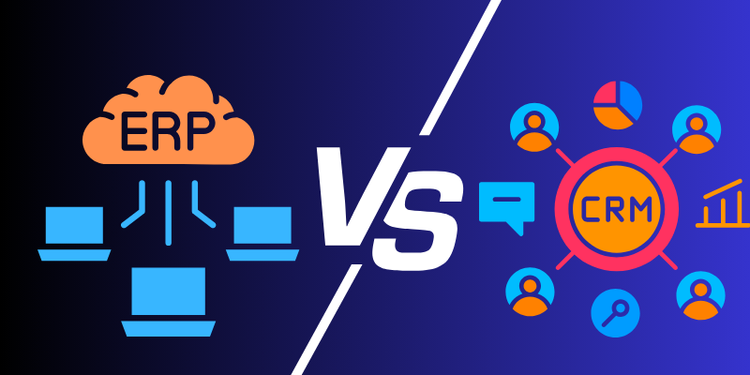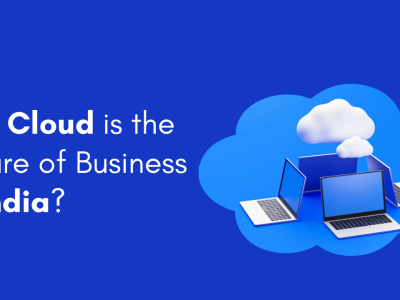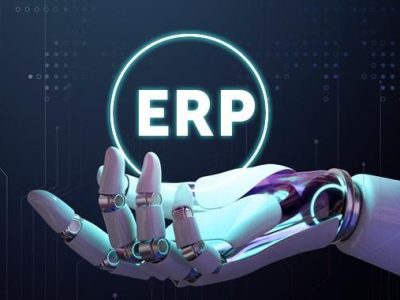In today’s fast-paced business landscape, having the right technology infrastructure is critical for growth, scalability, and profitability. Two essential systems that organizations rely on are Enterprise Resource Planning (ERP) and Customer Relationship Management (CRM) software. While both serve unique purposes, they are often misunderstood, and many businesses struggle to identify which one they need – or whether they should use both.
This blog explores the key differences between ERP and CRM, why modern businesses benefit from both, and how Microsoft Dynamics 365 provides a unified solution to streamline operations and boost customer satisfaction.
What is ERP (Enterprise Resource Planning)?
ERP software helps organizations manage and automate core business processes, including finance, supply chain, inventory, production, procurement, and human resources. It acts as the central nervous system of an enterprise, offering real-time visibility and coordination across departments.
Key Functions of ERP:
Financial management (accounting, budgeting, compliance)
Inventory and warehouse management
Procurement and vendor management
Supply chain and logistics
Manufacturing and production planning
Project management
Benefits of ERP Systems:
Improved operational efficiency
Reduced manual errors and redundancies
Real-time reporting and data accuracy
Better compliance and audit readiness
Enhanced scalability for growing businesses
What is CRM (Customer Relationship Management)?
CRM software focuses on managing a company’s interactions with current and potential customers. It is designed to streamline the sales process, improve marketing efforts, and enhance customer service.
Key Functions of CRM:
Contact and lead management
Sales pipeline tracking and forecasting
Marketing automation and campaign management
Customer service ticketing and case resolution
Customer segmentation and behavior analysis
Benefits of CRM Systems:
Improved customer engagement and satisfaction
Better sales team productivity
Targeted marketing and lead nurturing
Increased customer retention and loyalty
Comprehensive customer insights for decision-making
ERP vs CRM: Key Differences
While ERP and CRM may seem similar due to their overlapping data and business impact, they serve distinct purposes within the organization.
| Feature | ERP | CRM |
|---|---|---|
| Primary Focus | Internal processes and operations | External customer relationships |
| Core Users | Finance, operations, HR, supply chain | Sales, marketing, customer support |
| Modules | Accounting, inventory, procurement, HR | Sales, marketing, customer service |
| Main Goal | Efficiency and cost control | Revenue growth and customer satisfaction |
| Data Tracked | Products, costs, inventory, financials | Leads, contacts, sales activities, support tickets |
Why Modern Businesses Need Both ERP and CRM
For any business to grow sustainably, both internal efficiency and customer-centricity must be prioritized. ERP ensures your operations run smoothly, while CRM strengthens your external relationships. Operating without either leaves a gap in the business process.
Common Scenarios:
A manufacturing company may use ERP to manage raw materials and production, while using CRM to manage dealer relationships and sales.
A retail company might use CRM for customer loyalty and marketing automation, and ERP for inventory and invoicing.
Benefits of Using Both:
Unified data across departments
Streamlined lead-to-cash workflows
Better forecasting using both sales and financial data
Consistent customer experiences from inquiry to delivery
Why Choose Microsoft Dynamics 365 for ERP and CRM
Microsoft Dynamics 365 stands out in the market by offering both ERP and CRM capabilities within a single cloud-based ecosystem. Rather than integrating two separate platforms, businesses can deploy a solution that shares a common data model, user interface, and security infrastructure.
Key ERP Capabilities in Dynamics 365 Business Central:
General ledger, AR/AP, and financial reporting
Sales and purchase order processing
Inventory and warehouse management
Manufacturing and production planning
Project accounting and time tracking
Key CRM Capabilities in Dynamics 365 Sales & Customer Service:
Lead and opportunity management
Sales forecasting and performance dashboards
Case management and knowledge base support
Omnichannel customer service tools
Marketing campaign automation
Advantages of Using Dynamics 365 for Both ERP and CRM
1. Unified Data Platform
Dynamics 365 uses Microsoft Dataverse to centralize data, eliminating silos between departments. This provides a single source of truth for all stakeholders.
2. Seamless Integration with Microsoft Tools
Dynamics 365 integrates natively with tools like Microsoft Teams, Outlook, Excel, SharePoint, and Power BI. This improves user adoption and makes reporting more intuitive.
3. Scalable and Modular Architecture
You can start with what you need and scale later. Add CRM modules to your ERP solution as your sales and support teams grow, and vice versa.
4. Enhanced Customer Experience
With sales and service teams having full visibility into financial, inventory, and order data, customers receive faster, more accurate responses.
5. AI and Automation
Dynamics 365 includes built-in AI for sales predictions, customer sentiment analysis, and process automation, helping businesses stay proactive and competitive.
Implementation Considerations
Before deploying Dynamics 365, businesses should:
Conduct a needs assessment
Choose the right partner with ERP and CRM experience
Define clear KPIs and success metrics
Train employees on both modules
Plan for data migration and system integration
Final Thoughts
While ERP and CRM serve different functions, their collaboration creates a complete operational picture for any organization. Microsoft Dynamics 365 brings both together in a single solution, helping businesses operate efficiently and connect meaningfully with customers.
If you’re looking to digitally transform your business with a single platform that covers financials, operations, sales, and service, Dynamics 365 is the smart choice.
Businesses that invest in both ERP and CRM set themselves up for long-term growth, agility, and customer satisfaction. And with the flexibility and power of Dynamics 365, it’s easier than ever to achieve this balance.







